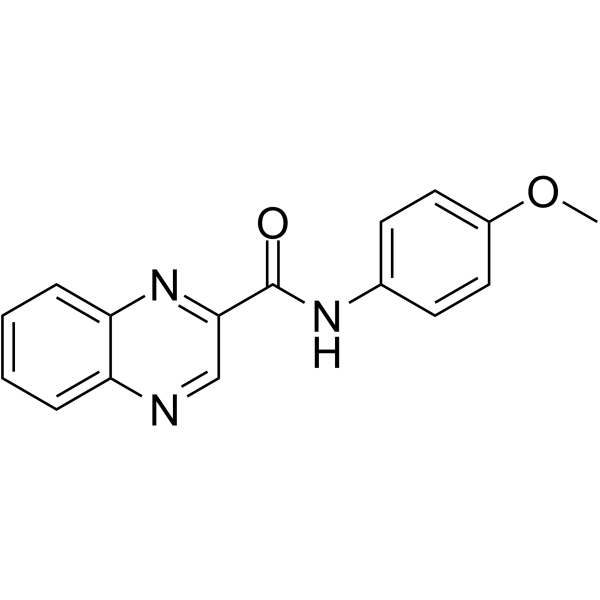5-HT3 antagonist 5
Modify Date: 2025-09-11 14:49:04

5-HT3 antagonist 5 structure
|
Common Name | 5-HT3 antagonist 5 | ||
|---|---|---|---|---|
| CAS Number | 901599-43-7 | Molecular Weight | 279.29 | |
| Density | N/A | Boiling Point | N/A | |
| Molecular Formula | C16H13N3O2 | Melting Point | N/A | |
| MSDS | N/A | Flash Point | N/A | |
Use of 5-HT3 antagonist 55-HT3 antagonist 5 is a quinoxalin-2-carboxamide compound, a 5-HT3 receptor antagonist. 5-HT3 antagonist 5 exerts antagonism on 5-HT3 agonist and 2-methyl-5-HT, and shows anti-depressant effect in mice[1]. |
| Name | 2-Quinoxalinecarboxamide, N-(4-methoxyphenyl)- |
|---|
| Description | 5-HT3 antagonist 5 is a quinoxalin-2-carboxamide compound, a 5-HT3 receptor antagonist. 5-HT3 antagonist 5 exerts antagonism on 5-HT3 agonist and 2-methyl-5-HT, and shows anti-depressant effect in mice[1]. |
|---|---|
| Related Catalog | |
| Target |
5-HT3 Receptor |
| In Vitro | 5-HT3 antagonist 5 (compound 4c) exhibits 5-HT3 receptor antagonisms in longitudinal muscle myenteric plexus preparation from guinea pig ileum against 5-HT3 agonist, 2-methyl-5-HT, with pA2 value of 5[1]. |
| In Vivo | 5-HT3 antagonist 5 (compound 4c) (1 mg/kg; i.p.; single dose) decreases the duration of immobility and shows anti-depressant effect in FST mice[1]. Animal Model: Swiss albino mice (23 ± 2 g)[1] Dosage: 1 mg/kg Administration: Intraperitoneal injection; single dose; locomotor scores tested 10 min after administration Result: Reduced the duration of immobility as compared to the vehicle-treated (control) group. Showed no effect on the locomotion of mice as observed in spontaneous locomotor activity. |
| References |
| Molecular Formula | C16H13N3O2 |
|---|---|
| Molecular Weight | 279.29 |
| InChIKey | UUFCEPQEIQOEAL-UHFFFAOYSA-N |
| SMILES | COc1ccc(NC(=O)c2cnc3ccccc3n2)cc1 |
| Storage condition | -20°C |